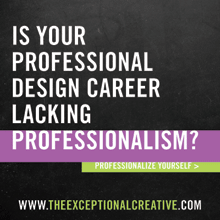The only part of the process I didn't like was the paperwork. The evaluation system is based on numbers. If you know me, you know I really don't like numbers. I'd rather sit down and have a conversation with each soon-to-be graduate. Alas, that wasn't possible, so I settled for circling the scale and scribbling notes on the margins. And now, because this is the closest I'll get to those individual conversations, I'm blogging. As I sat in the third row of the Hoover Auditorium, I was reminded of all the portfolio panels and conferences and visiting artist events I attended and what I learned from each of them throughout my formal education.
Between those memories and the evaluation I conducted last night, here are several things upcoming designers should be thinking about. Graduating designers and up-and-coming creatives alike, consider these your official Clipboard Notes from StudioM:
- Brand yourself. Whether you straight-up use your name or generate a creative company name, you need a name and you need to brand that name. Prospective employers and clients view your company's brand as an example of your work. Consider it a real-life test of your branding-capabilities. Also remember that your brand serves as a vehicle for your work. Don't focus on it as a portfolio piece in itself. Save the fancy stuff for your future jobs. Keep your resume, business card and website clean and simple.
- Consistency is king. From the way you dress to the work you show to how you showcase your work, being consistent is one of the most important things to keep in mind. Using the same logo, color, type and design elements throughout your presentation and printed pieces is actually easier, too. Go figure. Don't make it harder than it should be. You'll be more successful as a result.
- Be picky. We'd rather see only 8 solid portfolio pieces than 8 solid pieces and 5 so-so pieces. Step outside yourself and look at the work objectively. If you have a hard time with this, call on your professors or the designers you're aspiring to be for help. They'll be honest with you if you ask them to be. Narrowing down work also encourages the viewers to look through all of it. Most creative big wigs are way too busy to spend more than 3 minutes viewing your work. Make it quick and painless for them by being picky. *Note: Leave personal projects like baby shower and wedding invitations out of your portfolio completely. They might be cute, but work that required strategy and high-level design is much more desirable.
- You are special. But what's your specialty? Know where your strengths are. If you're serious about getting work, you'll make your specialties known. Use specific terms like 'technical illustration', 'web design' or 'branding' rather than listing broad terms or claiming skill in too many categories. There is strength in specificity.
- Design is a business of passion. To add to the previous note, you need to show passion in your specialties. I want to work with people who are good and what they do and love what they're good at. Many employers will pass on an übertalented apathetic designer for an average but engaged one. In the words of John Maxwell, "People don't care what you know until they know that you care."
- Train your tongue. You may think you got the whole talking thing down around ages 4 or 5. Not true. Practice articulating the goals and objectives of each solution in your portfolio. Practice the phrases you'd like to use when someone asks where you glean inspiration. Practice the extraction of every "um", "uh", hem and haw from your casual conversation so when you're in a spotlighted situation they don't sneak out. Maybe most importantly, practice keeping your mouth shut when someone is reviewing your work. A man who uses words wisely is thought to be wise. "The heart of the wise instructs his mouth and adds persuasiveness to his lips." Proverbs 16:23, The Bible (NASB)
- Mind your manners. Say thank you to anyone and everyone who takes the time to view your work. Whenever possible, send a thank you card via snail mail. Trust me, you won't come off as an outdated designer; you'll appear to be sincere, thoughtful and thankful - three qualities that are certainly not overrated and will encourage further contact.




No comments:
Post a Comment